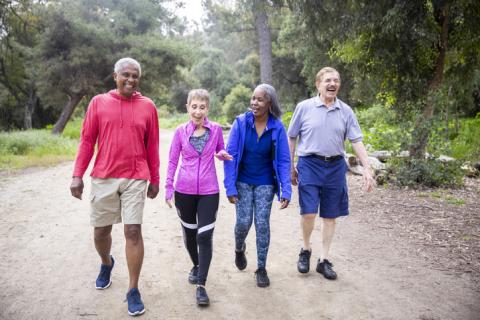Did You Resolve to Get More Exercise?
“No one can feel happy and joyous all the time, even if that’s what we feel pressured to experience,” said Katherine Nordal, Ph.D., former executive director of professional practice at the American Psychological Association. “There are several things we can all do to help fight off those blue feelings. Make sure your holiday expectations are realistic. Avoid overextending yourself and your budget. If a close family member or friend is no longer living, you may want to find ways to recognize that person and start new traditions. Try to maintain some of your normal routine. Pay attention to your feelings. If you can’t seem to shake the blues, your feelings may be about other things in your life.”
Now that the holidays are over, things might be getting better—or, they might not. So-called “post-holiday depression” is fairly common among seniors. After all the hustle and bustle of making preparations for Christmas, Hanukkah, Kwanzaa, New Year’s Eve or whatever other traditional celebrations we celebrated, our world suddenly becomes quiet. Even if we welcome the reduced workload once the festivities are over, we can feel deflated. And when all the holiday lights come down, we’re even more aware of how dark it is this time of year.
If feelings of depression persist, it’s important to talk to your healthcare provider. Depression can be treated with counseling, medications, or perhaps light therapy if seasonal affective disorder is suspected. Lifestyle choices also make a difference. Getting enough sleep, spending more time with other people and managing stress all help. And if you make New Year’s resolutions, there’s a good chance “get more exercise” was on your list. Stick to that one, because physical activity is one of the best ways to supports not only physical health, but also emotional well-being!
Why is exercise such an effective depression-buster?
For most of us, getting a good workout lifts our mood, but why? In 2019, a study by the kinesiology department of McMasters University in Ontario offered insights. According to the research team, “Physical activity may help ‘turn on’ genes within muscle, which can then influence the key metabolic pathways that ultimately produce mood-enhancing chemicals, such as serotonin, within the brain.”
But if genes in our muscles fight depression, could that be bad news for seniors, who typically lose muscle over time? “Muscle loss is a common problem in the elderly which may restrict that pathway and therefore increase the risk for depression,” confirmed lead researcher David Allison.
Fortunately, Allison’s research, which was published in the American Journal of Physiology—Cell Physiology, found that “the underlying mechanisms that make us feel good when we exercise persist into old age and highlight the importance of staying active.” His team studied a group of seniors and found that “three months of exercise was enough to enhance gene expression within the skeletal muscle.”
“Even individuals who are already metabolically healthy—with good weight, good blood pressure and blood sugar levels—need to prioritize regular physical activity to maintain or improve upon their mental health,” says Allison. “We have shown such benefits are still achievable in old age and further emphasize the importance of maintaining an active lifestyle.”
